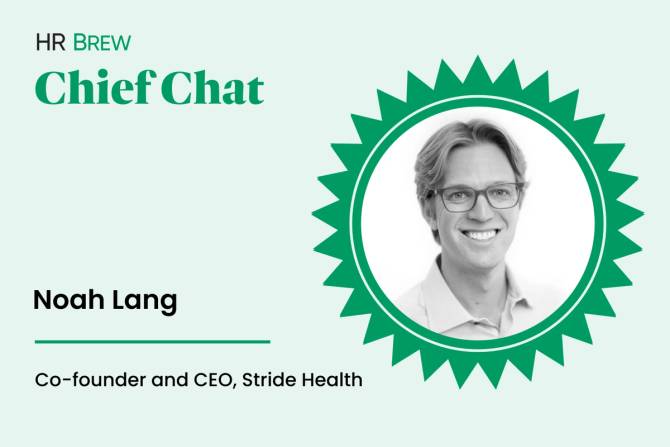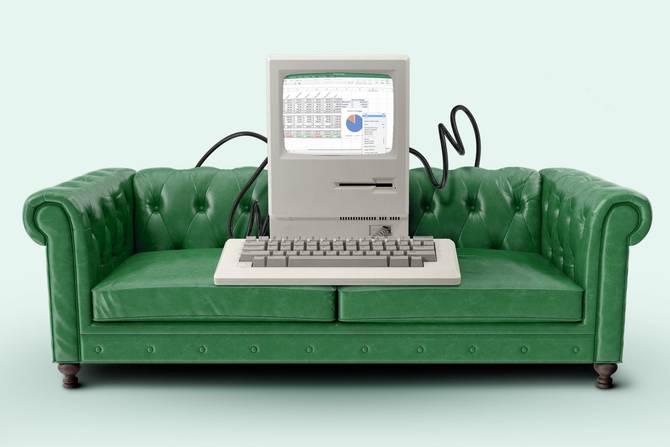Welcome back! It’s February 6. Consider this your one-week warning to plan a Galentine’s Day surprise for your work wife.
In today’s edition:
 Elephant in the room Elephant in the room
 World of HR World of HR
 Chief chat Chief chat
—Kristen Parisi, Shannon Young
|
|
Photo illustration: Dianna “Mick” McDougall, Source: mphillips007/Getty Images
A fly-on-the-wall is usually harmless. They mill about and don’t generally cause a disturbance. An elephant in the room, on the other hand, does just the opposite. And when HR leaders join employee resource groups (ERGs), they can wind up being a fly or, however unintentionally, an elephant.
ERGs have gained popularity at a rapid pace since 2020, and can be an effective tool for supporting marginalized communities and their allies.
“ERGs are a great way to mobilize people and to build community within an organization and to increase the safe spaces to talk about some of the challenges that people experience,” Ella Washington, professor at McDonough School of Business at Georgetown University told HR Brew.
However, because some HR leaders are seen by employees as not to be trusted, DE&I experts who spoke with HR Brew said that people people should consider how joining an ERG might affect their colleagues.
Proceed with caution. Washington said HR must understand the overall tenor of their company’s culture and have an awareness of their perception among employees before deciding whether to join an ERG.
HR’s participation should vary based on the topics discussed in meetings. For example, if a BIPOC group is discussing a racist incident at their company’s executive level and feelings of unsafety, the presence of an HR leader “would drastically change the dynamic of that conversation,” said Nani Vishwanath, consultant at DE&I consultancy the Courage Collective. “It’s important for the HR person to be mindful of: is this a place where I could bow out?”
Transparency and boundaries. Even if employees might be hesitant about HR’s presence, that doesn’t mean they shouldn’t join. Vishwanath explained that there are a few ways they can do so without putting off others in the group. Keep reading here.—KP
|
|
|
You were hired to manage people, not IT. Electric lets you focus on what you do best—and block out the distractions with a free pair of AirPods Pros.
Electric empowers HR teams to spend more time on people and less time on operations. In fact, Electric customers saved an average of 1,100 working hours last year. That’s 7 whole months!
No matter your team’s needs, Electric has your back. Their experienced IT specialists handle everything from device procurement and application provisioning to credential management and compliance, letting your team focus on people again.
And when you take a qualified meeting with Electric, they’ll gift you a free pair of AirPods Pros. You must be an IT decision-maker at a US-based company with 10–500 employees to qualify.
Schedule your meeting before Feb. 28.
|
|
Francis Scialabba
Between 45 and 55, on average, women typically go through a major physiological change known as menopause, with symptoms ranging from from brain fog to heart palpitations lasting up to a decade, all while many are trying to navigate their careers. Sounds fun, right? A bipartisan group of UK lawmakers focused on how employers can better support women at work doesn’t think so.
Where in the world? Some 92% of menopausal women in the UK say their symptoms impacted their ability to function at work, according to a July 2022 report from the Women and Equalities Committee. The report concluded with proposed legislation that would expand the 2010 Equality Act to include employment protections for menopausal women.
However, the British government struck down the proposal last month, saying the Equality Act, as it stands, sufficiently protects menopausal women, according to Bloomberg. It claimed that new protections could have “unintended consequences which may inadvertently create new forms of discrimination, for example, discrimination risks towards men suffering from long-term medical conditions.” It also argued that any significant changes to the Equality Act could result in a major reform of the broader law.
The committee responded by accusing the government of ignoring the problem, the Guardian reported.
Satellite view. A 2021 overview from the European Menopause and Andropause Society recommends that employers develop specific policies related to menopausal health, and that HR professionals consult women on accommodations. The issue is getting more attention in the US, as well, where some companies are taking steps to offer menopause-specific health benefits, such as access to educational materials or specialized clinicians, or menopause PTO. Keep reading here.—KP
|
|
Noah Lang
People across the US have increasingly left desk jobs—by choice or otherwise—and joined the so-called gig economy as rideshare drivers, delivery workers, dog walkers…you name it. But while the benefits of gig work (like being able to set your own hours) are often touted, these jobs tend to come with one major drawback: a lack of benefits.
Stride Health is looking to change that. Noah Lang, co-founder and CEO of the California-based insurance broker, said Stride was created to connect workers who lack access to traditional employer-based benefits with a range of affordable insurance options—including plans offered through the federal exchange (Healthcare.gov), for which the company is an approved partner.
Stride Health’s free online platform tailors health insurance and benefit recommendations to a person’s income level and circumstances. The model seeks to disrupt the traditional employer-based insurance model by helping users find coverage (and handle any related tax credits) that is not tied to their job.
And major companies are taking notice. Stride boasts Uber and Red Lobster as two of the “hundreds” of employers that use its Affordable Care Act health portal for independent contractors. It has also launched partnerships with Allstate and others.
In this interview, Lang talks about how Stride is helping to change the conversation around health insurance and benefits, and what that could mean for the future of US workers.
This interview has been edited and condensed for clarity
Tell me more about Stride and the space it occupies in the insurance industry.
We’re building a new benefit system. I know that sounds bold and crazy, but that’s why we’re all here: We live in a world where the benefit system was built for companies 70 years ago…Our product consists of this health coverage engine, where we built a recommendation engine and algorithm that basically meets [a person] where [they’re] at. Keep reading here.—SY
|
|
Today’s top HR reads.
Stat: The US economy added 517,000 jobs in January, while the unemployment rate fell slightly to 3.4%. (Bureau of Labor Statistics)
Quote: “Next we’re working on flattening our org structure and removing some layers of middle management to make decisions faster.”—Mark Zuckerberg, co-founder and CEO of Meta, on where the company will make its next cuts as it enters what he dubbed its “year of efficiency” (Insider)
Read: The uncertain economy might put more power in the hands of employers seeking RTO. (the Wall Street Journal)
|
|
-
House Republicans filed legislation that would limit the salary of DE&I employees at the Department of Defense to a maximum of $31,000 a year.
-
Minu, a Mexico-based employee wellness startup, secured $30 million in new funding to build its gamified financial education app.
-
Amazon has been cited for OSHA violations in warehouses in three states for putting employees in high-risk situations that could result in back injuries.
-
Kenyan lawmakers have introduced legislation that would prevent employers from contacting employees after hours.
|
|
Catch up on the top HR Brew stories from the recent past:
|
|
|







